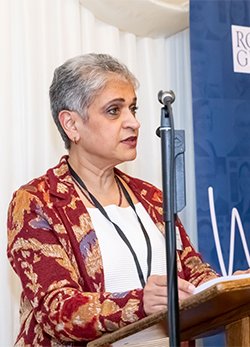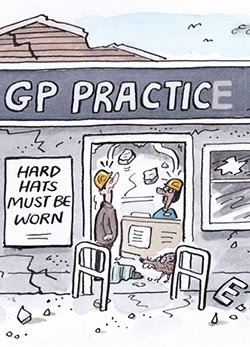

The first six months of the SCA
With a general election coming before January 2025, the College reached out to the three main Westminster parties to hear from them directly. We asked them what challenges they believe general practice is facing, what their plans would be if they form the next government, and what they want our members to know, plus a follow-up on their policies. College Chair Professor Kamila Hawthorne also looks at their responses in her opinion piece.
The spokespeople
The three parties were represented by:
- Conservatives - Victoria Atkins MP, Secretary of State for Health and Social Care
- Labour - Preet Kaur Gill MP, Shadow Minister for Primary Care and Public Health
- Liberal Democrats - Daisy Cooper MP, Deputy Leader and Spokesperson for Health and Social Care

The questions
What do you see as the key challenges facing general practices and their patients?
Conservatives - Victoria Atkins
“When I was first appointed as Health and Social Care Secretary I said I wanted to reform the NHS and social care to make them faster, simpler and fairer. A thriving and strong general practice is central to those plans.
“First, is it clear that GPs and their teams are working incredibly hard to get faster care to patients. It was a significant achievement to reach our manifesto target of 50 million extra GP appointments months ahead of schedule. Day in and day out GPs, practice nurses, and our other clinical roles are delivering outstanding care – from preventing illnesses from developing to offering continuity in managing long-term conditions. I am enormously grateful for these efforts.
“We also know that patients place a high importance on the ease of making an appointment. That is why I want to make it a simpler experience to book an appointment and receive care – including upgrading practices with the latest cloud based telephony services as part of our Primary Care Access Recovery Plan. We’ve made good progress on our commitments in the Plan.
“My third priority area is around fairness. I know this will speak to many GPs who are passionate champions for tackling health inequalities in their areas. All of us agree that the foundations of the NHS – care free at the point of use, no matter your background or where you live – are part of what makes us proud to be British. We must continue to strive to uphold those principles. In my position I draw on my own experience as an MP for a Lincolnshire constituency, covering a very large, very rural and coastal area. My constituents often have to travel miles for an appointment, and I have appreciated the challenges that some of my local GPs face around workload, recruitment and retention. That is why I am such a strong supporter of the ambitions of our Long Term Workforce Plan – including a commitment to increase GP training places by 50% over the next 15 years. This will help ensure that the public can call upon a strong general practice workforce, no matter where in the country they reside.”
Labour - Preet Kaur Gill
“After 14 years of Tory mismanagement, general practice isn’t working for patients or practitioners. Across the country, we’ve seen countless examples of GP practices handing in their contracts. The latest GP Worklife Survey revealed that over a third of GPs and record proportions of practitioners under 50 were looking at leaving the profession within five years. We are, of course, deeply worried by this.
“At the same time, satisfaction in our NHS is at an all-time low, down from 70% when Labour left office in 2010 to just 24% in 2023. After over a decade of Conservative government, just 34% of patients were satisfied with GP services.
“In this country, we spend more money on hospital care relative to community-based prevention than anywhere else in Europe. It means we have an NHS which is a sickness service, more than it is a health service. To resolve this, we must shift more care out of hospitals and into the community – that’s Labour’s vision, and we cannot achieve it without you.”
Liberal Democrats - Daisy Cooper
“The vast majority of people I talk to think their GPs are doing a fantastic job, but they're just frustrated that there aren't more of them. People know that GPs and their staff are deeply rooted in their communities. Some patients have a strong personal bond with “their GP”. But Healthwatch also says that access to GPs is consistently identified as the number one frustration raised by patients.
“Liberal Democrats believe that community and primary care should be the cornerstone of our health services. But they’ve been hollowed out - and general practice is no exception.
“GPs are now treating an aging population who are living longer with more complex needs. Patients on the 7.8 million NHS elective care backlog (not to mention all the other backlogs) are relying on their GPs to look after them as their conditions deteriorate.
“At the same time, GPs and their staff are adapting to new IT triage systems and building new relationships in the new ICB structures. And much of their work is unseen or misunderstood. From diagnosing patients, issuing prescriptions, referring to other services and chasing up letters to hospitals or other health agencies, there have been huge increases in work.
“Astonishingly, GPs are nonetheless providing millions more appointments, but it just isn’t sustainable.
“It brings potential risk to patient safety, to burnout, and quite frankly, to GPs’ enjoyment of the job. GPs also find themselves under attack, whether that's from politicians, the press, or from patients at the reception desk.
“The role of general practice is also changing. The ARRS funding has provided a widening of the skills and roles that now exist in general practice, but it doesn't get away from the fact that we still just need more qualified GPs.
“The Conservatives have failed in their pledge to hire 6000 more GPs, with the number falling in full time equivalent terms since they made that promise in 2019.
“Currently though, we are simply losing GPs faster than we can recruit them, and it's not just through retirement. There is a huge retention problem. 82% of full-time equivalent GPs leaving or reducing their hours are under the age of 60. We are pouring into a leaky bucket, and Liberal Democrats are committed to fixing this.
“Fundamentally, there's no getting away from the fact that we do just need more GPs. That's why the Liberal Democrats have made a bold and ambitious commitment in this area and made it a central pledge of our campaign.”
If your party wins the next election, how do you think general practice will look in five years' time?
Victoria Atkins
“Over the coming few years I would want to see us getting to grips with recruitment, with the expansion in training numbers now bedding in, good progression in the delivery of the Long Term Workforce Plan, and hopefully more GPs staying in the NHS as a result of our pensions changes. We are investing £240 million on digital tools, telephony and training for general practice, and I would also want to see the huge investment we are making in new technology and IT infrastructure as part of the Government’s Spring Budget announcement making a difference on the front line, enabling doctors to spend more time with patients and less on admin.”
Preet Kaur Gill
“My vision is for an NHS where GPs are thriving not surviving, and where patients know they can access their GP in a timely manner in the way most convenient for them.
“For far too long, the valuable work that GPs do has been ignored by the Conservatives. Labour’s vision is to shift services out of hospitals and into the community, so that the NHS becomes as much a Neighbourhood Health Service as it is a National Health Service.
“We will train more GPs, take pressure off those currently working in the system, and where clinically appropriate diversify the ways in which patients are able to access the healthcare they need.
“We will recruit 8,500 new mental health professionals, with support in every school and mental health hubs in every community. We will also train more district nurses and health visitors. This will allow far more patients to be seen in the comfort of their home and provide a route to catching problems early.
“We know continuity of care is as good for doctors as it is for patients. So, we will incentivise continuity and support practices to effectively stratify their populations to identify those who stand to benefit the most from regular contact with the same healthcare professionals.”
Daisy Cooper
“The Liberal Democrat vision for general practice is to make public health and primary care the beating heart of our health services. We are pledging to increase the number of full-time equivalent GPs by 8,000 in five years and embark on a 10-year capital plan that aims to look not just at hospitals but at the primary care estate too. This would include a review of outdated treasury rules, so GP practices are not priced out of city-centres to ring-road locations, away from the populations they serve.
“Ensuring GPs feel fulfilled in their roles, with enough time and staff to see patients is critical to ensuring to good care. To achieve this we would introduce a new "retire and return" scheme and more attractive flexible career paths to boost morale.
“We also want to enable continuity of care, by enabling people aged over 70 and those with long-term health conditions to access the same named-GP for every appointment.
“Some of this can be achieved by boosting the workforce with an additional 8000 full-time equivalent GPs, some will be helped by expanding the Pharmacy First model, freeing up GP time from treating routine infections and ailments.
“Ultimately what patients and GPs need is a government with the political will to prioritise public health and primary care.”
What one message would you like to send to GPs?
Victoria Atkins
“We value you and we value your work. I know the pressure the whole NHS is under, and how hard you are working to provide the best care for your patients. I am very clear also that Whitehall does not have all the answers: some of the best insight and the most effective reforms – for the short, medium or long term - originate at local or regional level, and that applies to general practice just as much as hospital care.”
Preet Kaur Gill
“That we will listen to you and work with you to revitalise general practice. GPs do outstanding work, dedicating their lives to caring for others. There couldn’t be a worthier cause, and it really speaks to how badly the Conservatives have got this wrong that despite this, so many GPs are so unhappy in their jobs and considering leaving the profession now.
“Labour values your commitment and dedication to your communities, and I am committed to a creating an NHS fit for the future where everyone can access the care that they need, and where GPs can thrive.
“General practice is the bedrock of our NHS, and we will put it front and centre of our plans to get our health service back on its feet, so you can do what you do best - looking after your patients. That means rebuilding continuity of care after 14 years of decline, cutting the red tape that ties your hands behind your back and building a genuine Neighbourhood Health Service.
“In 1997, the last Labour government inherited an NHS in crisis and went on to deliver the shortest waiting times and highest patient satisfaction in history. Working together with you, we can do it again.”
Daisy Cooper
“I’ve seen time and again how hard GPs work. I’ve witnessed some of the millions more appointments being delivered every year. I’ve seen GPs go the extra mile to support some of my most vulnerable constituents, such as those who are seeking asylum or homeless. At the start of the vaccination programme, I saw GPs and their staff hit the ground running by setting up and running vaccination centres before the NHS machine could crank into action.
“The Liberal Democrats want to thank you for being there for patients when they need you. We hear you: we know you're overworked, understaffed, and voting with your feet. We completely understand that general practice cannot be turned round without you, or the next generation trained up without your expertise.”
Party policy
Victoria Atkins
In the last manifesto you committed to 50 million more general practice appointments, an increase the number of staff working in primary care by 26,000 and 6,000 extra GPs. While the first two look like they are being met we have actually seen a fall in fully-qualified FTE GPs since 2019, why do you think this is and what more could you do on GP recruitment following the election?
“Spending on General Practice has risen by almost a fifth in real terms between 2017/18 and the most recent data in 2021/22, and we have made good progress against our manifesto commitments – with the latest statistics showing there are nearly 2,800 more doctors in general practice than in 2019. That partly reflects that the benefits of our existing policy changes, for instance on pensions, are beginning to filter through. However, I am clear we cannot stop here and so that’s why I put so much emphasis on reforming how we train and retain our primary care staff as part of our Long Term Workforce Plan.”
Preet Kaur Gill
Labour has previously said that we currently underinvest in primary care compared to other parts of the NHS. How would a Labour Government fix this when resources are tight and the acute sector is facing a significant budget deficit?
“Labour knows that it is only through economic growth that we can sustainably resource strong public services. That’s why our first mission in government will be to get our economy growing, so there is more money in people’s pockets and higher tax revenues that can be invested into services like primary care.
“Right now the NHS is on its knees and is in desperate need of investment and reform to get it back on its feet. It’s a 20th century service that isn’t fit for the modern era, where we catch illness too late, which means worse care for patients at greater cost to the taxpayer.
“As a proportion of total healthcare spend, it’s no secret that we underinvest in primary care and community services. To make the NHS fit for the future, we must over time shift our focus, so we can deliver a Neighbourhood Health Service, with healthcare on your doorstep, there for you when you need it.”
Daisy Cooper
You plan to give a guarantee that every patient can see a GP within a week or within 24 hours if in urgent need. What support would you offer to general practice to make this possible and are you concerned about unintended consequences of setting more targets?
“We are acutely aware of the pressures facing GPs and we will not force surgeries to deliver another target without significant investment and more staff, all of which are part of our plan.
“Critically, our guarantee is part of a five-year plan, which is intrinsically linked to boosting GP numbers with an additional 8,000 full time equivalent GPs. We expect that half this number will be reached by boosting recruitment and half from retaining more experienced GPs.
“Our plan is focused on offering a first appointment within seven days. Planned follow-up appointments, necessary for monitoring symptoms or prescriptions, or when people want to delay the appointment for personal reasons, will not have to be delivered within seven days.
“We all know the benefits of ensuring everyone can get an appointment in good time, not just to people’s health but the economy too. When people can’t see their GP, ailments diagnoses are delayed, or people turn up at A&E in desperation instead. It’s also worth noting the incredible job that GPs currently do in seeing half of all patients within a couple of days and the majority within a week already. In short, we believe it’s time that primary care is given the resources to make sure everyone can access care as soon as they need it.”
Read more
Thank you for your feedback. Your response will help improve this page.



